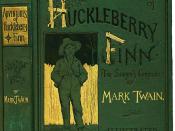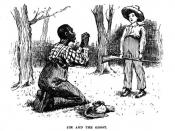The societies in "Lord of the Flies" and "The Adventures of Huckleberry Finn" both have startling and often horrifying effects on the individuals within them. William Golding and Mark Twain both present novels where the characters must suffer the consequences of society, which are often quite harsh. However, these consequences can also be a lesson to the individual in that society, and sometimes produce a positive effect. The society or societal expectations can often force the individual to go against their morals and commit actions that they normally wouldn't. The character can often fall back on society's prejudices to justify their actions. The negative actions that are influenced by society are often seen in both Lord of the Flies and Huckleberry Finn. However, the positive qualities also begin to emerge in characters of both novels. Authors frequently use literary devices to support a specific theme to enhance its message to the reader.
William Golding and Mark Twain both use setting and characterization in Lord of the Flies and Huckleberry Finn to show that humans are affected both positively and negatively by society.
Golding uses setting in "Lord of the Flies" to show how it affects the boys' behavior in their new society. Golding specifically chose the uninhabited island for several reasons. Because there is no other civilized life on the island, the boys must make their own decisions about their fates. The boys realize this after they have all been assembled by Ralph, and Jack says, "Then we'll have to look after ourselves" (Golding, 21). The island is isolated from any other type of organized society and the boys begin to use pieces of their old society to make a new one. Ralph tries to preserve his former society by trying to regulate everything, such as the fire,


